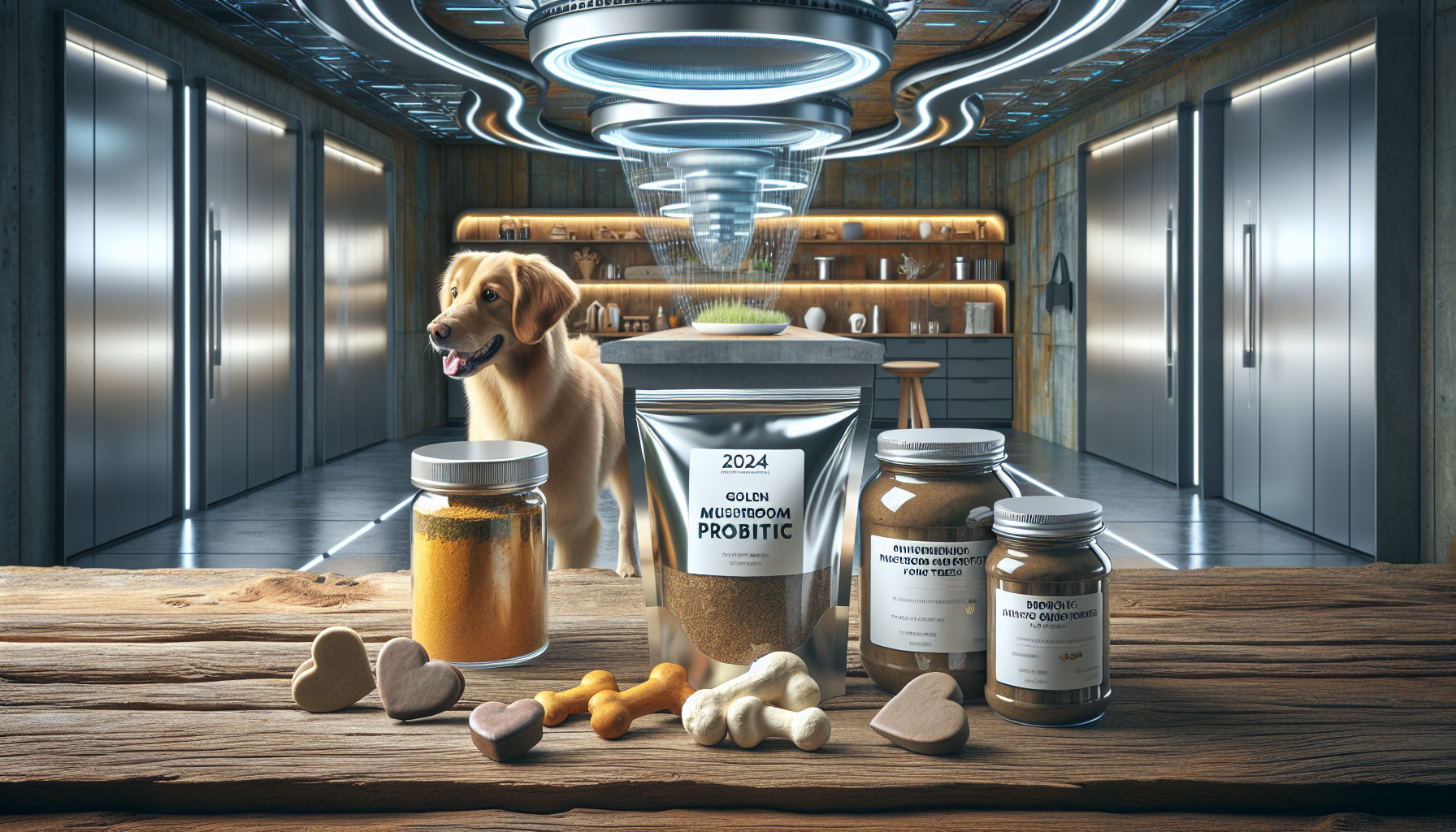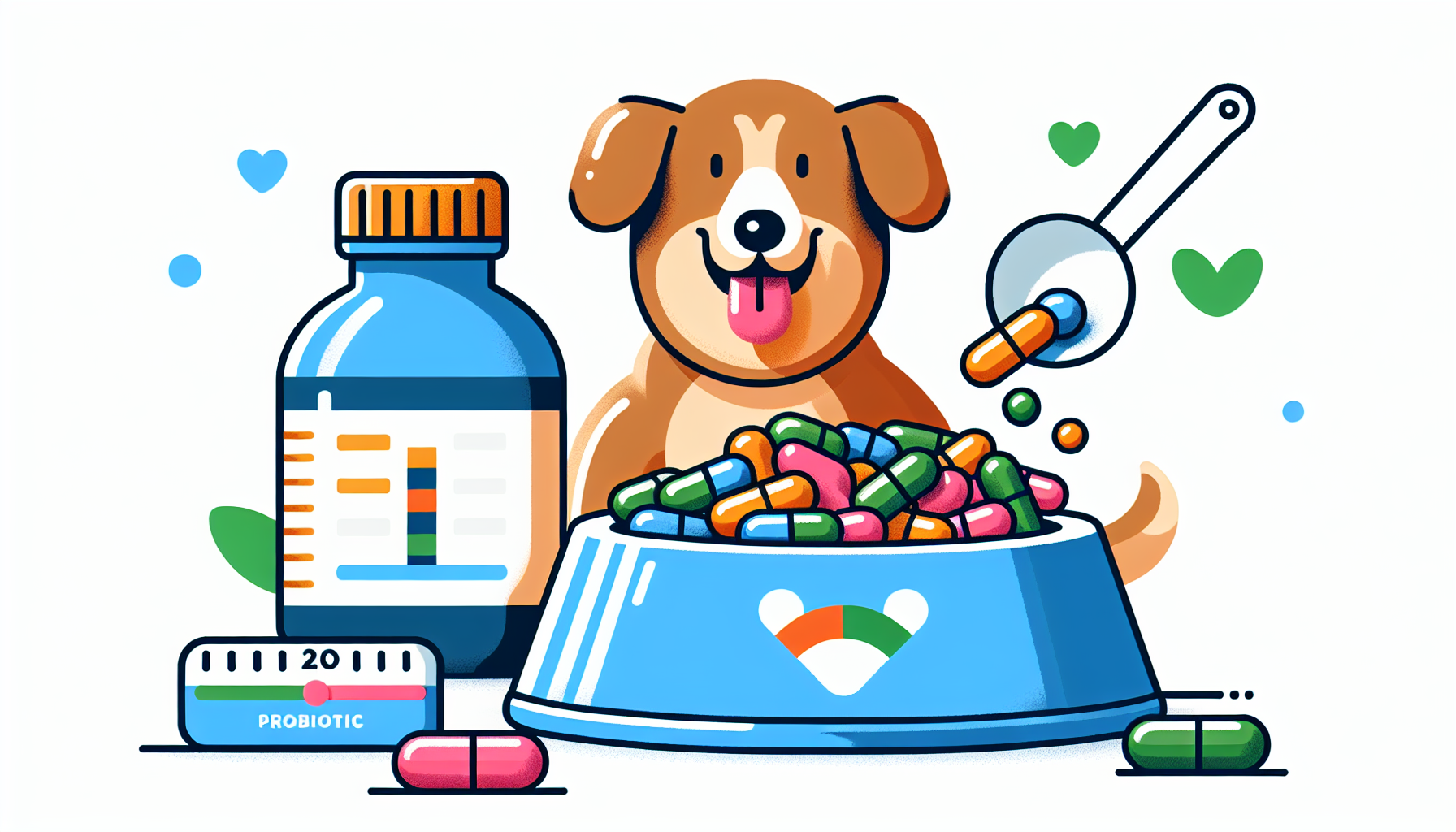Maintaining your dog’s gut health is vital, and probiotics are the unsung heroes in this quest. Grounded in the latest research and vet insights, our guide unveils the top dog probiotic picks of 2024, demystifying their benefits and how they factor into your dog’s nutritional needs.
Key Takeaways
- Probiotics are vital for maintaining a healthy gut microbiome in dogs, improving nutrient absorption, and supporting overall health by preventing digestive disorders and enhancing immune function.
- A combination of probiotics and prebiotics is recommended to form a ‘dynamic duo’ that supports the digestive health of dogs by nourishing beneficial gut bacteria and maintaining a balanced microbiome.
- Probiotic supplements and natural probiotic-rich foods both play a role in canine health, with supplements providing targeted benefits and natural foods offering a more holistic approach; the choice depends on a dog’s individual health needs.
Understanding Probiotics and Your Dog's Health
Living microorganisms, probiotics improve your dog’s health by fostering a healthy gut microbiome, a critical factor for digestion and nutrient absorption. In short, they’re the “good guys” who help keep your dog’s digestive system in tip-top shape. They suppress the growth of harmful bacteria, bolster the immune system, and maintain a harmonious equilibrium in the body, helping your four-legged friend to thrive.
Highly safe for dogs, probiotics can become essential when the gut ecosystem is disrupted, like during an antibiotic regimen, a diarrhea episode, or after consuming spoiled food. They ensure normal digestive function in these situations, enhancing the breakdown and utilization of food in the digestive tract, resulting in improved overall nutrition.
The Role of Good Bacteria in Digestive Health
Beneficial bacteria such as Fusobacterium, Bacteroidetes, and Firmicutes play a crucial role in your dog’s digestive health, acting as unsung heroes. These beneficial microorganisms enhance the dog’s digestive system by promoting the growth of friendly bacteria, maintaining a balanced and healthy gut microbiome, and enhancing overall gut health.
These beneficial bacteria have several benefits for dogs, including:
- Preventing diarrhea
- Managing small intestinal bacterial overgrowth and inflammatory bowel disorders
- Bolstering the immune system
- Combating harmful pathogens
- Averting allergies
- Sustaining a healthy weight
All of these benefits contribute to the dog’s overall well-being.
As such, always remember the importance of a healthy gut microbiome when considering your pet’s health!
How Probiotics Support Normal Serum Cobalamin
Cobalamin, also known as vitamin B12, is a nutrient that your dog needs for optimal health. Probiotic bacteria help maintain normal serum cobalamin levels by fostering a favorable gut environment that enhances nutrient absorption. Certain strains, such as L. casei Zhang, L. plantarum P-8, and E. faecium SF68, have demonstrated notable efficacy in supporting serum cobalamin levels.
By maintaining normal serum cobalamin levels, probiotics offer a wide range of health benefits, including:
- improving gut flora balance
- reducing inflammation
- enhancing immune response
- preventing infections
- aiding in digestion
- breaking down foods
- synthesizing necessary nutrients and vitamins
- fortifying the mucosal barrier
- fostering overall well-being.
Thus, probiotics aren’t solely focused on gut health, they play a significant role in your dog’s overall health!
Probiotic Power: What Makes Them Essential?

Probiotics act as potent allies in upholding your dog’s health. They contribute to a stronger immune system by normalizing the digestive environment, enabling the immune system to function effectively, and by preventing pathogenic bacteria from causing diseases. Their benefits extend beyond digestion, as they help to improve your dog’s coat, promoting strength, luster, and overall texture.
Probiotics offer a range of therapeutic properties that can assist in alleviating a range of conditions in dogs such as:
- Diarrhea
- Intestinal inflammation
- Allergies
- Anxiety
- Bad breath
Therefore, irrespective of whether your dog has a sensitive stomach or if you simply wish to enhance their overall health, probiotics should be a vital addition to their diet.
Boosting Physical Health Beyond Digestion
Probiotics and prebiotics are a dynamic duo that work together to support your dog’s gut health. While probiotics are beneficial bacteria that maintain or replenish healthy gut flora, prebiotics stimulate the growth of these beneficial gut bacteria by serving as their food source. This symbiotic relationship fosters their development and function, leading to a healthier gut microbiome and enhanced digestion for your dog.
Beyond aiding digestion, probiotics can also improve your dog’s coat, promoting strength, luster, and overall texture, which are indicative of your pet’s internal well-being. Furthermore, probiotics are recognized for their therapeutic properties that can assist in alleviating a range of conditions in dogs such as allergies, anxiety, bad breath, and immune disorders. Therefore, probiotics not only aid digestion but also boost your dog’s physical health.
Probiotics vs. Prebiotics: The Dynamic Duo
Often confused with each other, probiotics and prebiotics serve different yet complementary roles in your dog’s gut health. Probiotics are living microorganisms that maintain or replenish healthy gut flora, while prebiotics are carbohydrate compounds that serve as nourishment for these beneficial bacteria.
Together, they work in synergy to promote a balanced and healthy gut microbiome in dogs. When combined, probiotics and prebiotics promote a balanced and healthy gut microbiome in dogs, influencing not just the gut biome and digestion, but also nutrient absorption, immune system, and even skin and coat health.
Indeed, they form the dynamic duo for maintaining gut health and achieving a natural balance!
Probiotic Supplements vs. Natural Meals
There are two main ways to introduce probiotics into your dog’s diet: through probiotic supplements and natural meals. Probiotic supplements offer a concentrated source of beneficial bacteria that contribute to gut and digestive health, as well as the maintenance of healthy skin and coat in dogs. On the other hand, natural meals provide a more holistic approach to gut health, with foods like live yogurt, sauerkraut, and kombucha offering a natural source of probiotics.
While probiotic supplements have their benefits, they may sometimes cause digestive issues like:
- diarrhea
- constipation
- bloating
- gas
Plus, there’s a possibility that the probiotics may not withstand the pH levels in the gut. Hence, in deciding how to integrate probiotics into your dog’s diet, it’s crucial to weigh both the advantages and potential downsides of each method.
When to Choose Supplements Over Natural Foods
At times, you may need to opt for probiotic supplements over natural meals, especially when your dog requires an extra supply of probiotics. This could be the case if they are not receiving sufficient amounts from natural foods. Certain human foods, such as yogurt, kefir, and fermented vegetables, contain live cultures that may provide benefits to certain dogs. However, introducing new foods into a dog’s diet can result in gastrointestinal issues and other health complications, making the use of a probiotic supplement a safer option in many cases.
Remember, each dog is unique when choosing between probiotic supplements and natural meals. Always consult your vet to determine the best approach for your dog’s specific health needs and dietary preferences.
The Best Probiotic Products for Dogs in 2024

In 2024, there are several top-notch probiotics for dogs products that offer a range of benefits for gut health. These include mushroom powders from Woofshrooms.com and probiotic-packed treats like Yumi Dogs chews, which contain prebiotics and dog probiotics, such as chicory root, yeast, and Enterococcus faecium, to support digestion and bowel regularity.
Another standout product is Vet’s Kitchen Digestive Care Chicken Flavour. This probiotic sauce contains components like:
- enterococcus faecium bacteria
- prebiotics
- digestive enzymes
- L-arginine
These ingredients aid in maintaining gut health, encouraging healthy bowel movements, and delivering anti-inflammatory properties, all of which contribute to healthy digestion and encourage normal digestive function.
Mushroom Powders from Woofshrooms.com

Woofshrooms.com offers an array of mushroom powders that provide a natural source of probiotics to support your dog’s gut health. These mushroom powders are derived from Lion’s Mane, Chaga, and Turkey Tail mushrooms, which are known to improve immune system function and provide numerous other health benefits for dogs.
Administering mushroom powders is as simple as sprinkling them onto your dog’s food or incorporating them into their favorite treats. However, it’s important to be mindful of potential side effects, especially conflicts with other medications including diarrhea, rashes, and vomiting, especially for pets with bleeding disorders, low blood pressure, liver or kidney disease, or immune-mediated disorders.
Treats That Pack a Probiotic Punch
Probiotic dog treats are a convenient and tasty way to incorporate beneficial bacteria into your dog’s diet. One such example is NutriPaw Pre & Probiotic Digestive Treats. These meaty flavored treats deliver prebiotics and probiotics, promoting a healthy micro-flora balance and minimizing the negative impact of harmful bacteria.
The treats contain a combination of components including:
- Prebiotics
- Probiotics
- Flaxseed
- Chicory root
- Papaya
- Maqui berry
- Pumpkin
- Greek yogurt
These ingredients are known to support digestion, soothe tummies, prevent bum scooting, and provide essential fiber for dogs. Moreover, they are free from preservatives and GMOs, emphasizing safety and quality in their manufacturing process.
Integrating Probiotics into Your Dog's Diet

You can integrate probiotics into your dog’s diet using natural food sources, probiotic-enriched treats, or health supplements such as probiotic powders. Yet, it’s vital to strike the right balance in dosage and frequency to maintain optimal gut health without triggering digestive issues.
Different strains of probiotics address specific health concerns in dogs, such as reducing gassiness, managing diarrhea, and alleviating allergies, which can inform your choice of probiotic supplement. Generally, it’s advisable to make probiotics a daily part of your dog’s diet for their long-term health regimen, this ensures a consistent benefit to their gut health.
Dosage and Frequency: Finding the Right Balance
Identifying the appropriate dosage and frequency of probiotics for your dog can require a bit of balancing. It should be tailored based on individual factors such as weight, age, and specific health conditions, and it’s crucial to seek guidance from a veterinarian.
Probiotic dosage can vary based on the specific type, usually, a daily intake of 10-20 billion CFU is sufficient for maintaining digestive health. Probiotics can be safely administered to dogs on a daily basis, following the guidance of a veterinarian. In certain cases, long-term daily use may be suggested to uphold health benefits.
Tailored Probiotic Solutions for Specific Canine Needs
Similar to humans, dogs’ health needs vary at different life stages. Puppies require specific probiotic support to enhance their digestion and overall gut health, while senior dogs need help maintaining gut health and supporting their aging dog’s digestive system.
Be it raising a puppy or caring for a senior dog, customized probiotic solutions can meet their unique needs. These solutions consider the specific dietary requirements and digestive issues commonly observed in these age groups, offering targeted support for their gut health with probiotic bacteria specifically developed for each life stage.
Probiotics for Puppies: Laying the Foundation for Gut Health
Puppy-specific probiotics aid in:
- Creating a healthy gut environment
- Fostering appropriate digestion and nutrient absorption
- Contributing to the establishment of a harmonious intestinal flora
- Bolstering general gastrointestinal health
- Fortifying the mucosal barrier
- Optimizing digestion
- Boosting the immune system
- Fostering a robust gut microbiome in puppies
Puppies can commence incorporating probiotics into their diet at any stage to aid in the development of their digestive system. Advantageous strains for puppies comprise:
- Lactobacillus acidophilus
- Bifidobacterium animalis
- Enterococcus faecium
- Bifidobacterium lactis
- Lactobacillus casei
- Bifidobacterium breve
These strains aid in reducing diarrhea and enhancing stool quality.
Senior Dogs and Probiotics: Supporting Aging Digestive Systems
With aging, dogs’ digestive systems may become prone to issues like food allergies, infections, and inflammatory bowel disease. Probiotics can support their aging digestive systems by preserving a harmonious and healthy gut microbiome, averting diarrhea, and bolstering the immune system.
Soil-based probiotics (SBOs) are considered the most advantageous probiotics for senior dogs. These strains of spore-forming bacteria have the ability to survive and flourish in the gut, thereby enhancing digestive health and bolstering the immune system.
Therefore, if you own a senior dog, it’s worth considering the introduction of probiotics into their diet for maintaining gut health.
Summary
In conclusion, probiotics play a crucial role in maintaining your dog’s health, regardless of their age. From supporting digestion and nutrient absorption to promoting a strong immune system, the benefits of these beneficial bacteria are vast. Whether you choose to incorporate them into your dog’s diet through natural foods, probiotic-enriched treats, or supplements, remember to consult with your vet to find the right balance of dosage and frequency. After all, a healthy gut means a happy pup!
Frequently Asked Questions
Should I give my dog a probiotic?
Yes, giving your dog a probiotic can help balance their gut microbiome, improve digestion, and help break down carbohydrates, especially if your dog experiences stress-related diarrhea. It's recommended to give them 1-10 billion CFUs a day, and it can be easily added to their food or disguised in a treat.
What type of probiotic is best for dogs?
The best probiotics to restore your dog's microbiome after antibiotics are S. boulardii and soil-based probiotics like Bacillus subtiliis and Bacillus coagulans. They can also be given alongside antibiotics to protect the gut bacteria and prevent antibiotic-related diarrhea.
How do I know if my dog needs a probiotic?
If you notice constant itching, foul odor, excessive shedding, dry and flaky skin, ear infections, or diarrhea in your dog, they may benefit from a probiotic. These signs can indicate the need for a probiotic to support your dog's digestive and overall health.
Is there a human probiotic I can give my dog?
It's not recommended to give your dog human probiotic supplements, as they may not be effective or could cause adverse effects due to the differences in their digestive system and gut microbiome compared to humans. Look for specific probiotics formulated for dogs instead.
What are probiotics and how do they benefit my dog's health?
Probiotics are living microorganisms that promote a healthy gut microbiome in dogs, aiding in digestion, nutrient absorption, and immune system support. They also help suppress the growth of harmful bacteria and maintain a harmonious balance in the body.

